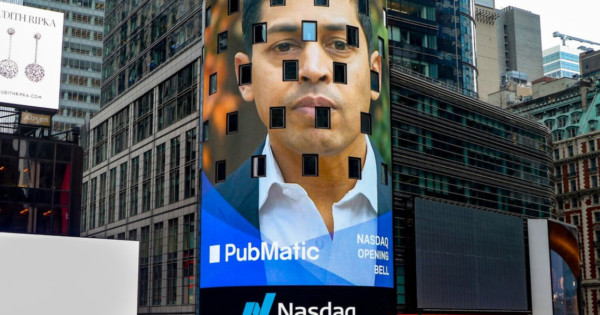
Rajeev Goel, co-founder and CEO of PubMatic, virtually rang the Nasdaq Opening Bell Wednesday morning as his 14-year-old company began trading on public markets.
The supply-side platform has gone public during a whirlwind year for the advertising industry. Aside from the pandemic, Google Chrome and Apple, the internet’s gatekeepers, are phasing out third-party cookies and IDFAs, respectively, from their market-leading platforms, fundamentally changing how online targeted advertising will work.
Adweek spoke with Goel about these changes and what PubMatic’s plans are moving forward.
This interview has been edited for clarity and brevity.
Adweek: As noted in your S-1, Verizon Media is by far your largest supply partner. Google and The Trade Desk are your big demand-side partners. Will you reduce your reliance on just a small number of players?
Rajeev Goel: As our overall business is growing quite rapidly, we think that concentration will come down over time. The next largest customer is in the 2%-3% range. So it’s really Verizon, but again, given that they’re the largest opportunity out there for us, we think they’re properly represented as a percentage of our business.
(For the years ended Dec. 31, 2018 and 2019 and the nine months ended Sept. 30, 2019 and 2020, Verizon Media represented 30%, 28%, 29%, and 21%, respectively, of PubMatic’s revenue derived from ad impressions sold on its platform. Along with its own sites, Verizon Media sells a large portion Microsoft’s digital ad inventory as part of a 10-year deal signed in 2015. That means Verizon Media represents the third- and fifth-most trafficked sites in the U.S., according to Comscore.)
Can you talk about how the phasing out of third-party cookies and IDFAs impact PubMatic’s business?
We’re partnered not only with The Trade Desk, a Unified ID 2.0, but also with LiveRamp and about a dozen other different identity solution providers. And we have a product in market called Identity Hub, which is one of our fastest-growing product launches ever, which makes it very easy for publishers to work with all of these different identity solutions.
Do you really expect many users on the open web to log in to every website they visit? And what do you do about the rest of the open web that isn’t authenticated and is still anonymous?
I think with trusted properties, the head of the market, users will log in to unlock free content. We’re built on the head of the internet with Comscore 2000 publishers around the world. So, we feel well-positioned in terms of where that identity transition will happen.
What would be more impactful on your business: third-party cookies going away or IDFAs going away?
I think the cookie is a broader part of our business today. Within mobile, we have both mobile app and mobile web. Combined, mobile is 55% of our business. IDFA is obviously one app platform; there’s Android. So, we think the impact from IDFA is relatively small.
We also saw, and we have experienced with this from GDPR, that most major advertisers, particularly on the brand side, don’t cut budgets in the short-term. What happens is they swap their budgets into the channels that are also working for them. For instance, when the IDFA change happens, I think we’ll see more bidding on Android users, more bidding on mobile web more, bidding on connected TV and digital video users
CTV is a fast-growing space drawing a lot of attention. PubMatic has made investments to build products for the space. How much of PubMatic’s revenue will come from CTV in five years?
https://www.adweek.com/programmatic/pubmatics-ceo-on-going-public-during-a-year-of-change-in-ad-tech/

